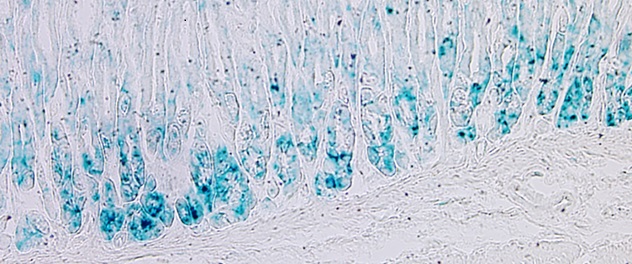 Interventions to regenerate stem cells
Interventions to regenerate stem cells
The GI Stem Cell Research Laboratory led by Yujiro Hayashi, Ph.D., studies stem cell biology of the gastrointestinal tract in health and disease. Dr. Hayashi's lab is identifying novel molecular and epigenetic pathways and exploring sustainable treatment options for gastrointestinal dysfunction by targeting stem cells in the gastrointestinal tract.
Overview
The number of older adults is rapidly increasing. Age-related diseases and disorders represent a major health care burden and are associated with a decline in the function of most organs. Gastrointestinal (GI) motor function also declines with age. Aging-associated GI motor dysfunction includes esophageal reflux, early satiety and anorexia, irritable bowel syndrome, constipation, and fecal incontinence.
Although these diseases and conditions are not themselves fatal, they negatively affect quality of life and predispose older adults to other diseases, protein-energy malnutrition, sarcopenia and frailty. Furthermore, recent reports have linked low dietary intake to increased overall mortality in older adults, suggesting that higher dietary consumption may be protective for these individuals. In other words, reduced food intake due to GI dysfunction may contribute to increased overall age-related mortality.
Therefore, it is important to understand the mechanisms underlying age-related GI dysfunction in the context of healthy aging and longevity. The mechanisms of age-related GI dysfunction are complicated and remain incompletely understood, in part due to the nonspecific symptoms of these conditions and the lack of sufficient medical attention.
The GI Stem Cell Research Lab is engaged in investigating the pathophysiology of aging-related GI dysfunction. Dr. Hayashi's groundbreaking research is addressing the role of stem cell aging in GI dysfunction such as reduced compliance and food intake in aging using cutting-edge techniques such as genome-wide epigenetic profiling, integrated omics analysis and optogenetics. Dr. Hayashi is investigating the utility of a drug already approved for human use to alleviate aging-associated gastric dysfunction and to promote healthy aging.
Data obtained from these studies will provide rationale for discovering new therapeutic targets. Furthermore, his lab aims to reveal a novel, pharmacologically realizable therapeutic approach to prevent gastric pacemaker stem cell decline and age-related gastric dysfunction. This advance will lead to improved quality of life. His lab also aims to discover a previously unrecognized mechanisms of stem cell aging, which may be of general significance.
About Dr. Hayashi
Yujiro Hayashi, Ph.D., has studied the physiology, pharmacology, biochemistry, molecular biology and epigenetics of the gastrointestinal tract. His lab's research combines concepts and techniques learned throughout his career, initially as a master's student in pharmaceutical sciences, as a doctoral student focusing on gastrointestinal stem cell biology, and as a postdoctoral scientist studying gastrointestinal neuromuscular cell- and molecular biology, and epigenetics. Dr. Hayashi is an assistant professor of physiology at Mayo Clinic College of Medicine and Science in Rochester, Minnesota.